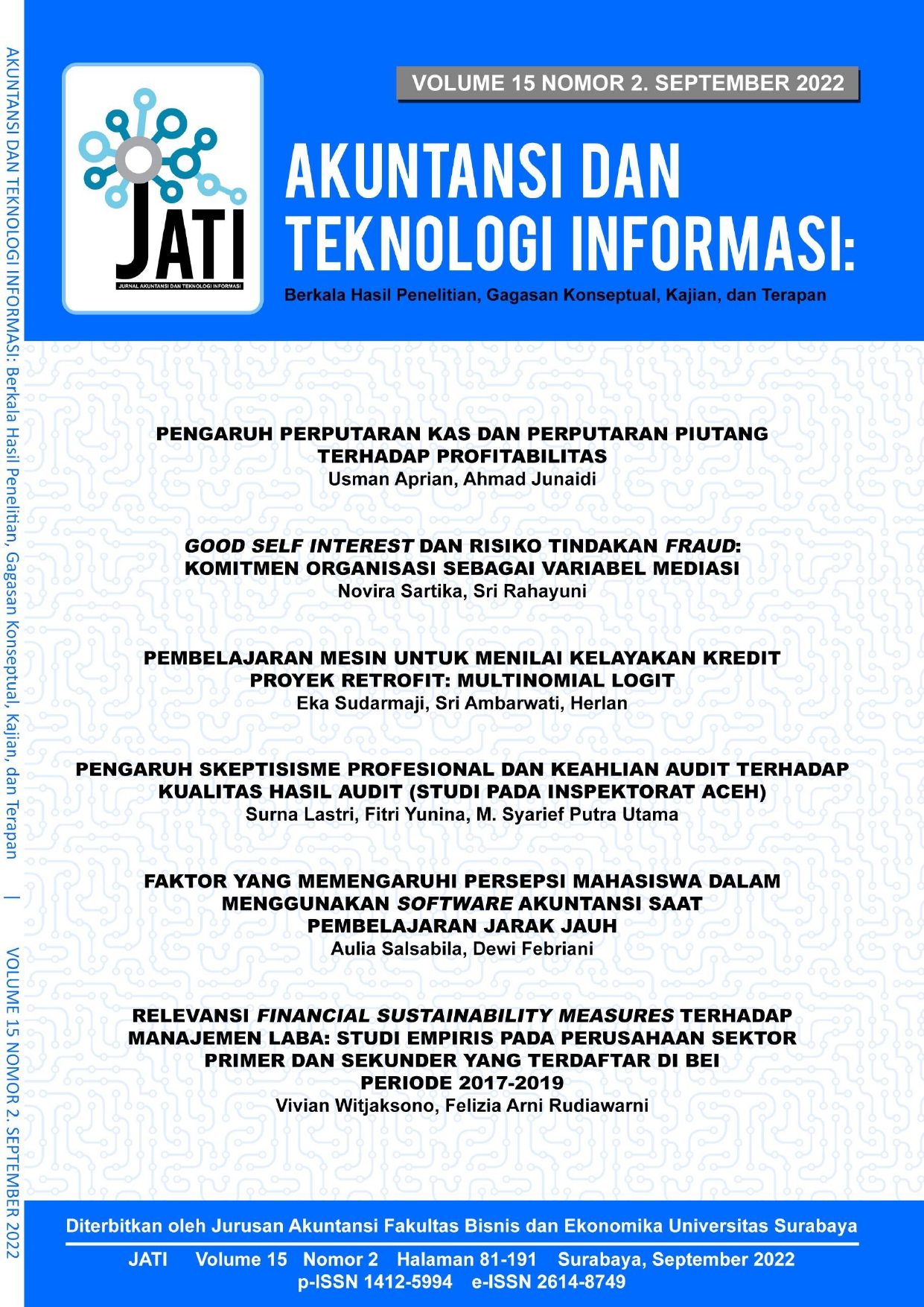PENGARUH PERPUTARAN KAS DAN PERPUTARAN PIUTANG TERHADAP PROFITABILITAS
 Abstract Views:
822 times
Abstract Views:
822 times
 PDF Downloads:
810 times
PDF Downloads:
810 times
Abstract
This study aims to determine whether cash turnover and receivable turnover have effects on profitability. The research was conducted at manufacturing companies listed on the Indonesia Stock Exchange in 2017-2019. This study used a purposive sampling method, with the number of 55 companies each year, therefore the total sample is 165. The statistical method uses multiple linear regression analysis with t statistics hypothesis testing. The results of this study state that cash turnover has a significant positive effect on profitability. That states, company’s effectivity in managing its cash to generate revenue or sales is very impressive. Contrariwise, receivable turnover has a negative and significant effect on profitability. That states, high levels of receivable can reduce the profitability because the amount of receivable owned is small, which means the credit sales made are low, thus sales volume and profitability will decrease as well.
Downloads
References
Agustia, Kadek Dewi, I Wayan Suwendra, F.Y. (2016). Dampak Peputaran Uang, Peputaran Piutang, dan Peputaran Saham Terhadap Produktivitas Organisasi Assembling di Bursa Efek Indonesia 2014. E-Diary Bisma Ganesha Schooling College, 4(1), 1-11.
Amaral, Matilde Canizio. (2017). Dampak Perputaran Uang, Perputaran Piutang, Perputaran Saham terhadap Produktivitas di Toko Umum Timor Leste. E-Diary Aspek Keuangan dan Bisnis, Perguruan Tinggi Udayana, 10, 3527-3548.
Arianti, Liling. NR (2018). Catat pengaruh rasio peputaran piutang, rasio peputaran kas, dan rasio perputaran saham terhadap laba PT. Asosiasi Industri dan Perdagangan Susu Ultrajaya, Tbk. Sekolah Universal Talk I Pamulang, 1-21. http://openjournal. buka ritsleting. pendingin ruangan. ID/indeks. php/snu/artikel/tampilan/945
Ayu, Eka Rahayu, J. S. (2014). Pengaruh Peputaran Duit Tunai, Peputaran Piutang Rekam, serta Perputaran Saham Terhadap Keuntungan Perkumpulan Gathering. Harian Ilmu Dewan, 2( 4), 1444- 1455.
Diana, Gadis Ayu. B. H. S. (2016). Pengaruh Arus Kas, Piutang, Persediaan Terhadap Keuntungan Asosiasi Substansial di BEI. Harian Kamar Sains serta Investigasi, 5( 3), 1- 18.
Eksandy, Arry, V. Meter. D. (2018). Pengaruh Peputaran Modal Kerja, Peputaran Piutang, dan Peputaran Kas terhadap Efisiensi Hirarki (Studi Peningkatan Kelembagaan Lokal Bursa Konservasi Indonesia, 2012-2015). Komponen Harian UMT, 2(2), 1-14.
Ikhsan, Arfan, S. (2018). Pengaruh Peputaran Kas serta Piutang Pembukuan Terhadap Keuntungan Asosiasi Santapan serta Minuman yang Tercatat di Bursa Dampak Indonesia. Harian Akuntansi serta Investigasi Bisnis, 18, 153- 161.
Kasmir. (2017)." Tes sinopsis rencana pengeluaran". Edisi 4. Pencetakan ke- 10. Jakarta: Rajawali Press
Kim, Tan Hek serta Elvie Maria, S. C. (2020). Pengaruh Arus Kas, Peputaran Piutang Rekor serta Peputaran Saham ke Return Worth of 0n Worth dalam Gathering Associations yang tercantum di Bursa Dampak Indonesia Periode 2015- 2017. Dibuat serta Tampilkan Harian Data, 3( 9).
Oktary Budiansyah, Yancik Safitri, Cherya, D. (2017). Pengaruh peputaran kas dan peputaran persediaan ke efisiensi. Tanggung jawab, 10(2), 1-12 https://doi.org/10.15408/akt. v10i2. 6139
Supatmin (2020). Dampak Peputaran Kas dan Peputaran Piutang ke Return on Value (Roe) Pt Indofood Berhasil Makmur Tbk 2009-2017. Ide Login Harian (Jif), 2(1), 11. https://doi. org/10.32493/fb.v2i1. 2020. 11- 26. 420.
Widya, Dwi Swara.( 2020). Pengaruh Arus Kas, Peputaran Saham serta Peputaran Aktiva Senantiasa ke Return Worth dari Asosiasi Obat yang Tercatat di Bursa Dampak Indonesia.
www.idx.co.id.
www.sahamok.com.

This work is licensed under a Creative Commons Attribution-ShareAlike 4.0 International License.
- Copyright on articles is retained by the respective author(s), without restrictions. A non-exclusive license is granted to Akuntansi dan Teknologi Informasi (JATI) to publish the article and identify itself as its original publisher, along with the commercial right to include the article in a hardcopy issue for sale to libraries and individuals.
- Articles published in Akuntansi dan Teknologi Informasi (JATI) are licensed under a Creative Commons Attribution-ShareAlike 4.0 International license. You are free to copy, transform, or redistribute articles for any lawful purpose in any medium, provided you give appropriate credit to the original author(s) and the journal, link to the license, indicate if changes were made, and redistribute any derivative work under the same license.
- By publishing in Akuntansi dan Teknologi Informasi (JATI), authors grant any third party the right to use their article to the extent provided by the Creative Commons Attribution-ShareAlike 4.0 International license.

 DOI:
DOI:









